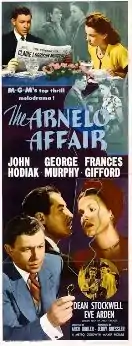The Arnelo Affair
The Arnelo Affair is a 1947 American film noir co-written and directed by Arch Oboler and starring John Hodiak, George Murphy, Frances Gifford and Dean Stockwell.[2]
| The Arnelo Affair | |
|---|---|
 Theatrical release poster | |
| Directed by | Arch Oboler |
| Produced by | Jerry Bresler |
| Screenplay by | Arch Oboler |
| Based on | the short-story "I'll Tell My Husband" by Jane Burr |
| Starring | John Hodiak George Murphy Frances Gifford Dean Stockwell |
| Music by | George Bassman |
| Cinematography | Charles Salerno Jr. |
| Edited by | Harry Komer |
| Distributed by | Metro-Goldwyn-Mayer |
Release date |
|
Running time | 86 minutes |
| Country | United States |
| Language | English |
| Budget | $892,000[1] |
| Box office | $838,000[1] |
Plot
A lawyer's wife, Anne Parkson(Frances Gifford) is bored and neglected. She begins meeting with one of her husband's clients, nightclub owner Tony Arnelo (John Hodiak), for interior design work. There develops an awareness between them that an affair is a possibility. One afternoon she arrives at Tony's, and soon after his girlfriend shows up. The girlfriend is upset by Anne being there and starts making a fuss. Tony arrives, hits his girlfriend, and Anne Parkson runs out. Police find the girlfriend murdered, Anne's unique compact near the body. Tony planted the compact, in order to blackmail and implicate Anne in the killing. He is in love with Anne and attempts to force her into leaving her husband. A homicide detective soon figures out the facts and confronts Tony. When Tony is made to realize that his lies and blackmail will destroy innocent Anne's place in society, he escapes the detective's custody in order to commit "suicide by cop".
Cast
- John Hodiak as Tony Arnelo
- George Murphy as Ted Parkson
- Frances Gifford as Anne Parkson
- Dean Stockwell as Ricky Parkson
- Eve Arden as Vivian Delwyn
- Warner Anderson as Detective Leonard
- Ruth Brady as Dorothy Alison
- Lowell Gilmore as Dr. Border
- Archie Twitchell as Roger Alison
- Ruby Dandridge as Maid
- Joan Woodbury as Claire Lorrison
Reception
The film earned $524,000 in the US and Canada and $314,000 elsewhere. Although MGM records do not state whether the film was profitable, the cost of $892,000 makes it likely it incurred a loss.[1]
Critical response
Film critic Bosley Crowther panned the film. He wrote, "And childish it is, beyond question, despite the promising' presence in the cast of John Hodiak, Frances Gifford, George Murphy and other minor 'names.' It's a 'stream of consciousness' fable about a lawyer's neglected wife who takes up with a night-club owner and gets into a most embarrassing jam. It is unmercifully slow and sombre and utterly devoid of surprise."[3]
Variety magazine was more positive. The staff wrote, "Arch Oboler, radio’s master of suspense, has effectively transposed his technique into the visual medium with The Arnelo Affair. Strictly speaking this is not a whodunit, nor can it be catalogued as a psychological suspense picture ... There’s never a question as to who committed the murder, but the crime is secondary to its effect on the characters involved. Until the film’s very climax, no hint is given to the ultimate denouement. Dialogue instills the feeling of action where none exists for much of the footage, and the gab is excellent but for a couple of spots when Oboler gives vent to florid passages."[4]
References
- The Eddie Mannix Ledger, Los Angeles: Margaret Herrick Library, Center for Motion Picture Study.
- The Arnelo Affair at the American Film Institute Catalog.
- Crowther, Bosley. The New York Times, film review, September 13, 1947. Accessed: August 11, 2013.
- Variety. Staff film review, 1947. Accessed: August 11, 2013.